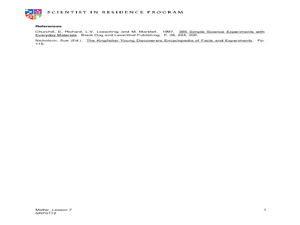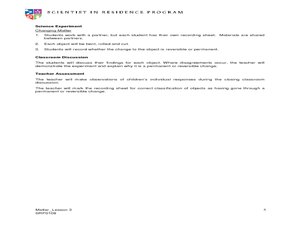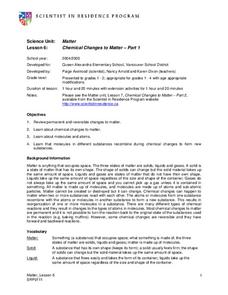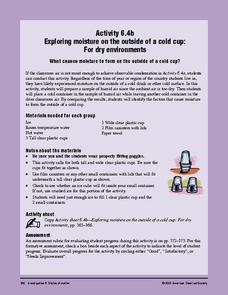Center for Learning in Action
Water—Changing States (Part 1)
Here is part one of a two-part lesson in which scholars investigate the changing states of water—liquid, solid, and gas. With grand conversation and up to three demonstrations, learners make predictions about what they think will happen...
Center for Learning in Action
Introduction to the States of Matter
Liquids, gases, and solids are the states of matter in which scholars investigate in a lesson plan that offers in-depth information and engaging activities that look into the three states and the changes their properties make when mixed...
Curated OER
Chemical Changes to Matter
Students analyze the causes of corrosion. In this chemistry lesson plan, students investigate what is necessary to cause chemical changes in matter. Students discover the causes of rust and tooth decay.
PBS
The 3 Phases | Phases of Matter | UNC-TV Science
Explore the states of matter without the mess or expensive equipment in a compact, informative activity. Scientists watch as the narrator explains the three states of matter using a glass of ice and soda in an animated video that...
Curated OER
Physical Changes to Matter
Pupils explore matter by conducting an in-class experiment. They experiment with water's various forms by melting and freezing water, identifying its new shape. These observations are recorded to supplement later discussion. They also...
Curated OER
Physical Changes and States of Matter
Fourth graders identify a physical change as one that results in a change in size, shape, or state of matter. After an initial teacher-led discussion and demonstration, groups of students get together to perform an experiment which...
Aquarium of the Pacific
States of Matter: Making Ice Cream
Who knew that learning about the states of matter could taste so sweet? This fun hands-on activity captures the attention of learners as they use what they know about solids, liquids, and gases to create their very own batch of ice cream.
American Chemical Society
Changing State: Evaporation
Why do experiments require a control? Guide scholars through designing an experiment to see what they can do to evaporate water faster with a lesson plan that stresses the importance of controlling all variables. The second activity...
Curated OER
Physical Changes and States of Matter - Two
Here's a wonderful lesson on how substances change states. Groups of learners are given trays with a chocolate bar, a piece of paper, an ice cube, and a balloon. During the activity, the groups closely observe the changes that each...
Curated OER
Physical Changes and States of Matter - One
Third graders study the three states of matter and identify the physical changes that take place between them. There is an initial teacher-led demonstration followed by a meaningful whole-class inquiry. These two activities should lead...
Science 4 Inquiry
The Ins and Outs of Photosynthesis
The most important chemical process on Earth is photosynthesis. Scholars explore the changes in the gases in our atmosphere as life on Earth developed. They create a model of photosynthesis and consider simple questions.
Micron Technology Foundation
States of Matter
Solids, liquids, gasses oh my! Young scientists will be amazed when they try this experiment, which uses dry ice to discover the states of matter through sublimation.
Curated OER
Changing Planet: Withering Plants - Stressing Over Lost Water
Expectant earth scientists examine the bottom side of a leaf and learn the role of the stomata. They consider the gas exchange that occurs through these structures and relate how the climate is changing to its impact on food crops. This...
It's About Time
States of Matter: Solid, Liquid, and Gas
Solid, liquid, and gas: they all matter. Scholars create an animation of the various states of matter, experiment with the temperature of water as it changes states, and observe carbon dioxide as it changes states. The lesson also...
Curated OER
Matter
Students recognize that some changes to matter are reversible and some are not. In this matter lesson plan, students experiment a physical and chemical change. Students record experiment results in their science journals. Students act...
American Chemical Society
From Gas to Liquid to Solid
From gas to liquid condensation to solid frost, water undergoes phase changes before young scholars' eyes! Using ice, salt, water, and a metal can, they set up an investigation that can be used in a physical science setting, or as part...
American Chemical Society
Condensation
It's time to break the ice! If you are doing all of the lessons in the unit, children have already seen that increasing heat increases the rate of evaporation, but is the opposite true? Does decreasing temperature cause more condensation...
American Chemical Society
Evaporation
This is one in several lessons that explore the relationship between temperature and phase changes of water. After some discussion, elementary physical scientists place wet paper toweling on a hot and a room-temperature water bag and...
American Chemical Society
Exploring Moisture on the Outside of a Cold Cup: For Dry Environments
If the area you live in is arid, or the preceding experiment in this unit didn't yield obvious results, use this one in place of it to help reveal where condensation comes from. The mini unit that this is part of a comprehensive...
Columbus City Schools
What’s Up with Matter?
Take a "conservative" approach to planning your next unit on mass and matter! What better way to answer "But where did the gas go?" than with a lab designed to promote good report writing, research skills, and detailed observation. The...
Department for Children, Schools and Families
Explaining Change Processes Using a Simple Particle Model of Matter
The more things change, the more they stay the same. This unit includes seven lessons starting with physical change and moving through to chemical change. Conservation of matter is explained clearly with multiple hands-on activities and...
Center for Learning in Action
Challenge with Solids, Liquids, and Gases
There's a container for every matter—liquid, solid, and gas. Pupils design three different containers, each with the capability to hold one of the states of matter, and share their design with the class.
Herff Jones Education
Chemical Energy
Provide the class with a quick lesson on chemical energy as they are assisted in creating hot and cold packs to demonstrate energy transfer between objects. They observe the energy change in matter as it transforms and distinguish...
Curated OER
Water in Earth's Hydrosphere
Environmentalists test stream water for temperature, pH, and turbidity. Each group shares their information and then the class makes an overall evaluation of the water quality. A slide show sets the backdrop for the teaching portion and...

























